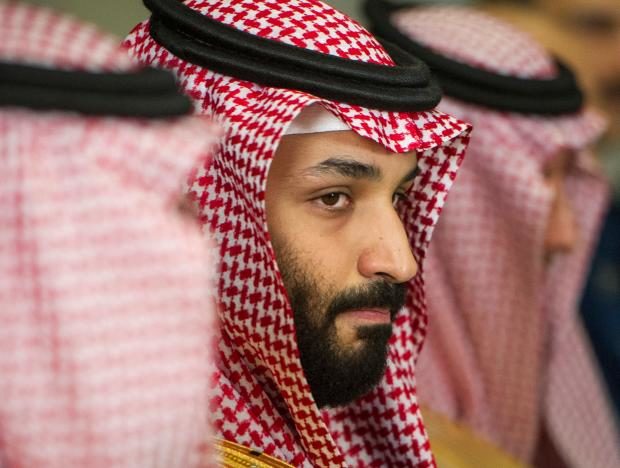
In this photo, taken March 22, 2018, Saudi Crown Prince Mohammed bin Salman meets with US Defense Secretary Jim Mattis at the Pentagon in Washington. AP FILE
RIYADH, Saudi Arabia – Saudi Arabia and Canada on Monday showed no signs of backing down in an escalating row over human rights, after Riyadh abruptly cut ties over Ottawa’s vigorous calls for the release of activists jailed in the kingdom.
The Saudi government expelled Canada’s ambassador, giving him 24 hours to leave the country, and recalled its own envoy to Ottawa, while freezing all new trade over what it slammed as “interference” in its internal affairs.
Ottawa did not give any ground over the shock expulsion of the envoy, Dennis Horak, with Foreign Minister Chrystia Freeland saying Canada would continue to defend human rights around the world.
The rupture, which underscores a newly aggressive foreign policy led by Crown Prince Mohammed bin Salman, comes after Canada denounced a new crackdown on women and human rights campaigners in the kingdom.
“The kingdom announces that it is recalling its ambassador to Canada for consultation. We consider the Canadian ambassador to the kingdom persona non grata and order him to leave within the next 24 hours,” the Saudi foreign ministry tweeted early Monday.
The ministry also announced “the freezing of all new trade and investment transactions with Canada while retaining its right to take further action”.
Later Monday, the row appeared to escalate as Riyadh said it will relocate thousands of Saudi students studying in Canada to other countries, and state airline Saudia announced it was suspending flights to and from Toronto.
A pro-government Saudi Twitter account provoked outrage when it posted -— and then deleted -— a 9/11-style digitally altered image showing a plane flying towards the Toronto skyline.
The account later apologized and the image was reposted with the plane removed, but screenshots of the original tweet spread quickly. Saudi Arabia’s media ministry said it was investigating the incident.
Foreign Minister Adel al-Jubeir said Saudi Arabia “will deal with any interference decisively”, dismissing Canada’s position as “built on misleading information”, in a statement carried by state media.
Last week, Canada said it was “gravely concerned” over the new wave of arrests of rights campaigners, including award-winning gender rights activist Samar Badawi, and called on Riyadh to “immediately release them.”
Canada doubled down on Monday.
“Canada will always stand up for human rights, in Canada and around the world, and women’s rights are human rights,” Freeland told an audience in Vancouver.
‘Unprecedented crackdown’
Samar was arrested along with fellow campaigner Nassima al-Sadah last week, the latest victims of what Human Rights Watch called an “unprecedented government crackdown on the women’s rights movement”.
Samar’s brother, blogger Raif Badawi, was arrested in 2012 and sentenced to 1,000 lashes and 10 years in jail for “insulting Islam” in a case that sparked an international outcry.
The latest arrests come weeks after more than a dozen women’s rights campaigners were detained and accused of undermining national security and collaborating with enemies of the state. Some have since been released.
Prince Mohammed, heir to the region’s most powerful throne, has introduced a string of reforms such as lifting a decades-long ban on women drivers in a bid to overhaul the kingdom’s austere image.
But the 32-year-old has simultaneously pursued a combative foreign policy — including leading a blockade of neighboring Qatar and a bombing campaign against Iran-backed Huthi rebels in Yemen — while cracking down on dissent at home.
The United Arab Emirates, a strong regional ally, supported the Saudi response to Canada, with a senior government official calling Ottawa’s behavior “unacceptable.”
Defense contract in peril?
In April, Canadian Prime Minister Justin Trudeau expressed his “serious concern” over the continued jailing of Raif Badawi to Saudi King Salman.
Badawi’s wife Ensaf Haidar has been granted asylum by Canada, where she is raising their three children.
“It is now time for other governments to join Canada in increasing the pressure on Saudi Arabia to release all prisoners of conscience immediately and unconditionally,” said Samah Hadid, Amnesty International’s Middle East campaigns director.
But Riyadh’s singling out of Canada is aimed at strongly discouraging other critical Western governments from speaking out, observers say.
“Canada is easier to cut ties with than the rest,” Bessma Momani, a professor at Canada’s University of Waterloo, told AFP.
“There isn’t a strong bilateral trade relationship and poking the Trudeau government likely resonates with Saudi’s hawkish regional allies. At jeopardy are the… thousands of Saudi students in Canada.”
Bilateral trade amounts to CAN $3-4 billion (US $2.3-3.1 billion) a year, according to Thomas Juneau, an assistant professor at the University of Ottawa.
But the damage could be more significant if a $15 billion deal agreed in 2014 for Canada to sell Riyadh light armored vehicles is scrapped, as thousands of jobs in Canada could be lost, Juneau said.
When asked about the contract, Freeland said the government “looks forward” to hearing from Riyadh about the future of the deal. /cbb